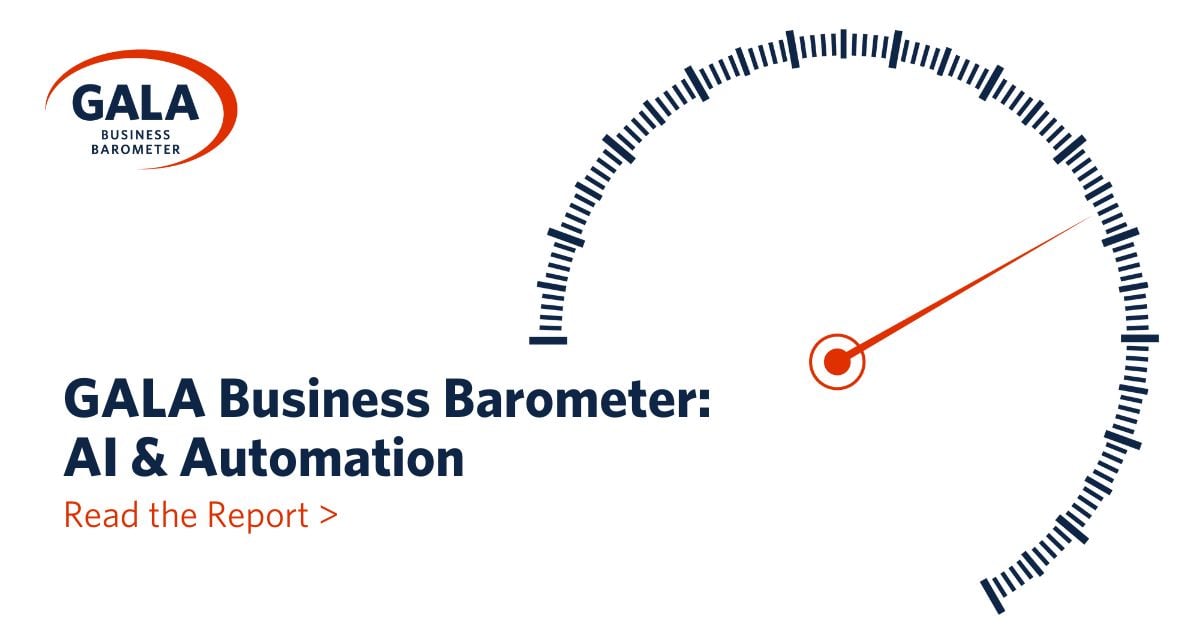- Home
- Resource Center
- Articles & Videos
- Uncovered: Production of the GALA Business Barometer
7 April 2025
Uncovered: Production of the GALA Business Barometer

Understanding Localization Trends Through the GALA Business Barometer
Now more than ever, those who work in the localization sector need reliable information on what’s happening in the industry. We hear from our community that there is resource scarcity, demand depreciation, and economic uncertainty. Yet, GALA has always existed to counter fear with facts, to oppose intimidation with information.
Now in its third year, the GALA Business Barometer program was preceded by GALA’s Pulse Surveys, which were conducted for two years starting at the height of the pandemic. Surveys are tough! It’s important to balance the need for information with the patience of the survey-taker. Too long, and they lose interest; too short and we don’t get valuable information.
As the staff person responsible for building the reports, my main concern is the quality of the data and my first thought is: are we asking the right questions? To account for this, GALA has enlisted a talented task force of industry experts to craft and hone the survey questions. We believe that the best people to provide suggestions are the ones working in this sector.
Data Quality and Representation Matter
One consideration in crafting the reports is ensuring we’re using reliable information. After all, GALA Business Barometer surveys are open to everyone. My first step is verifying the respondents using a combination of their organization name, email address, and survey completeness. Are there junk responses in the mix? Of course! And they are promptly disqualified from the results.
Now is also a good time to remind you that we value your privacy. GALA never sells your information to third parties. Even our GALA Business Barometer volunteer task force does not have access to your specific responses. All information is anonymized before it’s shared for review.
Another aspect we consider during analysis is representation, which goes beyond the simple geographic information we collect. Rather, we want to ensure that singular companies are not over-represented in the dataset. To counter duplicate data, I use a combination of job role, survey completeness, and a visual scan to eliminate responses that are least likely to be accurate. In some situations, I may merge a few responses from the same organization where one person has filled out the questions and another hasn’t.
This is a highly manual process. Yes, we can automate some things such as summarization of the write-in responses, however the bulk of the cleaning and analysis is done carefully by me – partly as a matter of principle and partly as a matter of obsession.
Connecting Research to Localization Trends
I’ve been working with data and research studies for almost two decades. I have a dual bachelor’s degree in history and political science and a master’s degree in international relations, so I’m used to spending my time poring over detailed research. I also have an obsession with current events and geopolitics.
Producing a professional report that can be appreciated by a diverse audience and adding the context of our “moment in time” is challenging. It can also be difficult to synthesize data that comes from stakeholders with drastically different perspectives, but we think it is important to try so that GALA’s audience can get a more complete picture of what’s going on in the industry.
This is why in our most recent GALA Business Barometer: Technology, AI, and Automation, we have segmented the results by end-client and LSC responses – so you can get the most useful benchmark for your company. These segments offer a closer look at localization trends across different business models, allowing organizations to compare their performance against industry peers.
Sharing Insight to Strengthen the Sector
The GALA Business Barometer program is founded on a reciprocal relationship. We leverage the collective experience of our community, break it down, slice it and dice it, then share it back with you in actionable data and insights. You support us, and we support you. This year, we’ve added the ability for respondents to receive a copy of their results to aid in benchmarking their own organization year-over-year.
There have been various industry surveys spanning decades, yet we believe the GALA Business Barometer program is unique in its reach and affordability. The GALA team is small, but our community is large. We have dedicated staff, volunteers, and support personnel who strive to produce a report worthy of a large consultancy at a fraction of the cost. We hope that the effort and expertise in the final reports is apparent, and most of all, we hope the GALA Business Barometer helps you make better business decisions rooted in clear data and current localization trends.
Download the Barometer Report 2025 Technology, AI, and Automation!

Jessica DiPietro
Jessica is the Data Program Manager at GALA, responsible for creating constituent surveys and producing insightful reports. She also manages user, organization, event, and content-related statistics, which is used to make decisions about how to best serve GALA members. Prior to working at GALA, Jessica received a Master's degree in China Studies from the University of Washington. She holds a dual Bachelor's degree in History and Political Science from Salisbury University in Maryland.


